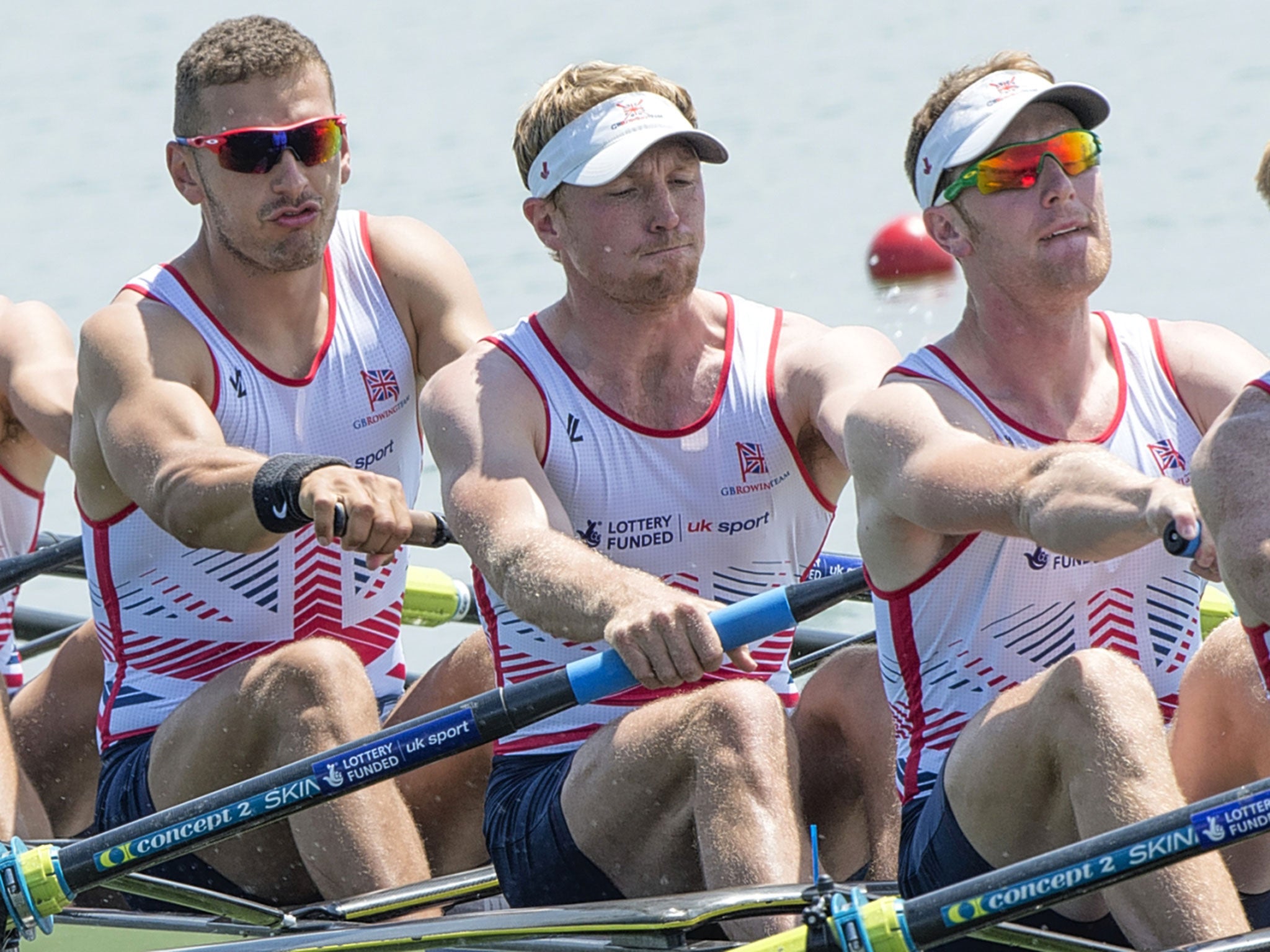No more rocking the boat for Moe Sbihi
Britain’s Muslim oarsman Moe Sbihi tells Nick Townsend he has changed his ways for the better

It was their final 10 strokes that won it; 10 agonising strokes as the British men, heedless of their muscles screaming in protest "no more", repelled their German nemesis. The difference may have been 0.008 sec of a second, reminiscent more of a Lewis Hamilton qualifying differential. Yet the significance of last Sunday's triumph on the waters in Lucerne for Moe Sbihi and his fellow eight medallion men should not be understated.
That defeat of the Olympic champions for the third occasion already this season adds fuel to the burning conviction that the British eight can avenge the outcome at London when the crews meet at the 2016 Olympic rowing regatta on the spectacular Lagoa Rodrigo de Freitas in Rio.
Three years ago, Sbihi won an Olympic bronze at Eton Dorney after the home eight were vanquished by gold medallists Germany and runners-up Canada.
“For at least the 18 months prior, we’d spoken about winning in London,” says the 6ft 8in Sbihi, rowing’s only practising Muslim. “I was gutted, and there’s not a photo of me smiling on the boat. There’s a lot of tears.” Though he has learnt to rationalise his feelings by reflecting on just how few have secured an Olympic bronze, the desire to put things right has not diminished.
In the three years since the London Olympics regatta, during which Sbihi has won World Championship gold in the eight in 2013 and repeated that feat last year in the four, he has conducted a rigorous self-analysis.
“I’ve come back with a sense of knowing that I needed to improve as an athlete and the way I viewed the sport,” he says. “I’d say in London I was a moody teenager in the crew. Hopefully now I’m an adult.”
Inevitably, you question this statement; not least because Sbihi, now 27, was well beyond his teenage years in 2012. Far from rowing back on it, he elaborates.
“If I’m honest, my temperament and the way I conducted myself around others, especially those in my crew, could sometimes be debilitating to what we wanted to do.
“I knew I needed to improve as an athlete, I needed to change in the way I viewed the sport, the way I conducted myself in and outside of training. It’s made me a better professional, a better athlete. I try to be more positive.”
Sbihi, who admits that “a couple of people” had made him aware of his deficiencies, adds: “I’m big, I’m physical, my stature suggests I should be somebody that’s pushing forward and leading. I think I did that role quite well in the four. I was the person doing the calls [directing stroke rates]. That was a big part of my development. But when you do the calls, if you don’t do it in the right way, you come across really badly.
“You can make the three other people in the boat feel like crap – especially if you say, ‘Oh, come on guys’, which I caught myself doing once. I just wanted a bit of oomph. I immediately apologised, because it made me look as if I was doing everything right and they were doing everything wrong.”
Today, he feels “in a very good place”, adding: “I’m doing a fairly decent job in maintaining a level equilibrium in how I’m feeling and how I’m going about training and rowing in general.”
What Sbihi, the Kingston-upon-Thames-born son of a Moroccan father and an English mother, cannot reproach himself for, however, is his influence on young Muslims who desire to take up a sport. “I’ve always maintained that my choice is the right choice for me. But there will be figures within the Islamic community within the UK, and around the world, who think what I do is wrong,” he says.
“For a young Muslim growing up through the teenage years, if your parents are pushing you, or if your sport is pushing you, there can be a great conflict in your life over the two things you’re passionate about: your faith and your sport. There will be a clash, and there will be a butting of heads. It’s how you deal with it.”
The timing of Ramadan, and the requirement to fast, which coincides with the peak of the rowing season, is one obvious potential collision point. For Sbihi, it has been resolved by a change of fasting schedule. “Jürgen [Grobler, the men’s chief coach] allows me to fast in the winter when the season is quieter.”
Beyond rowing Sbihi is determined that his voice, as a Muslim, can be every bit as powerful off the water as his imposing frame on it to counter any negative perceptions of Islam. “I just hope the press I am getting is positive for the situation.”
Sbihi was devastated by the killing of Lee Rigby in 2013: “It was steps backwards for the Islamic community. But you’ve got to understand: these are fanatics, the smallest percentage of the faith, and there are fanatics in every walk of life.”
This week the GB squad depart for a high-altitude training camp at Silvretta Lake in the Austrian Alps, ahead of the World Championships in France next month. “It’ll be tough,” Sbihi says. “But it’s that time of the season when you just push all of your chips in and make sure that the odds are in your favour by working extremely hard.”
Subscribe to Independent Premium to bookmark this article
Want to bookmark your favourite articles and stories to read or reference later? Start your Independent Premium subscription today.

Join our commenting forum
Join thought-provoking conversations, follow other Independent readers and see their replies